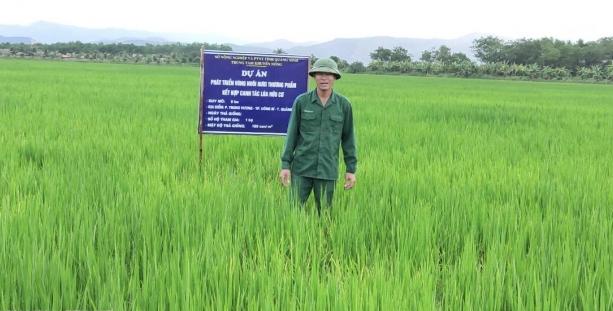May 19, 2025 | 22:51 GMT +7
May 19, 2025 | 22:51 GMT +7
Hotline: 0913.378.918
May 19, 2025 | 22:51 GMT +7
Hotline: 0913.378.918

Quang Ninh develops a commercial farming area, combining organic rice and sea worm growing in 90 ha in Dong Trieu, Uong Bi and Quang Yen districts. Photo: Anh Thang.
Agricultural Promotion Center in the coastal province of Quang Ninh has developed a commercial farming project that combines organic rice cultivation and sea worm raising in 90 hectares in 2020.
The sea worm, which is a favorite ingredient in the local cuisine, often lives along the river area in the districts of Dong Trieu, Uong Bi, and Quang Yen.
In the area, local farmers have embanked the riverbank into ponds and lagoons right in the rice fields to raise the sea worm by themselves spontaneously. Having potential but natural farming like that also faced limitations in breeds, farming procedures, and raising techniques.
In order to sustainably develop the resources and create a stable income for people, Quang Ninh Agricultural Promotion Center has implemented a project supporting farmers with sea worm breeds, agricultural materials, and production monitoring diaries to improve both rice and sea worm productivity.
According to the center, all cultured species in the project were well developed, promising an average yield of 300-350 kg of sea worm per ha per year, an increase of about 200-250 kg per ha per year compared with the natural raising. The rice yield also reached between 1.6 and 1.8 tonnes per ha each crop.
It was expected to have the first harvest of the combined products in January 2021, estimating the possible generate income from sea worm and rice to reach VND120-150 million (US$5,200-6,500) per ha.
Deputy director of the center, Nguyen Ba Lam said: “The center will continue to provide technical guidance to farmers, tours to help them exchange and learn experiences from other sea worm breeding facilities in other localities.”
Lam added they would also promote and support of the product consumption and build the brand for the sea worm of Quang Ninh in the market. Lam also called for more investment to develop other areas with the natural sea worm population in the province.
Author: Anh Thang. Translated by: Do Do. Edited by: Duc Huy.
![Reducing emissions from rice fields: [Part 1] Farming clean rice together](https://t.ex-cdn.com/nongnghiepmoitruong.vn/608w/files/news/2025/05/05/z6509661417740_a647202949c539012a959e841c03e1d3-nongnghiep-143611.jpg)
(VAN) Growing clean rice helps reduce environmental pollution while increasing income, allowing farmers to feel secure in production and remain committed to their fields for the long term.
/2025/05/19/5136-1-144800_230.jpg)
(VAN) The Nghe An Provincial People's Committee has just approved the list of beneficiaries eligible for revenue from the Emission Reductions Payment Agreement (ERPA) in the North Central region for the year 2025.

(VAN) 14 out of 35 domesticated elephants in Dak Lak province have had their living conditions improved, with 11 of them currently participating in the non-riding elephant tourism model.

(VAN) Muong Nhe Nature Reserve hopes that being upgraded to a national park will lay the foundation for forest protection efforts to be carried out in a systematic, modern, and sustainable manner.
/2025/05/16/3923-2-171845_52.jpg)
(VAN) Lower costs, higher yields, and improved soil quality are outstanding benefits that soybeans bring when integrated into the crop rotation system.

(VAN) The 'For a Green National Environment' programme aims to promote a green lifestyle, support businesses in implementing ESG practices, and turn Net Zero commitments into concrete actions.

(VAN) Cold-barn systems efficiently manage environmental and temperature conditions, which aids in the prevention of respiratory diseases in pigs and protects them from the vectors that transmit African swine fevers.